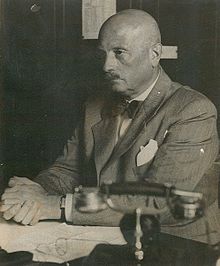Kristian Welhaven
Kristian Welhaven (11 October 1883 – 27 July 1975) was a Norwegian police officer. He was chief of police of Oslo for 27 years, from 1927 to 1954.[1] He was a leading force in establishing an organized Norwegian intelligence service before World War II, and in re-establishing it after the war. During the war years Welhaven was arrested by the Germans and imprisoned in both Norway and Germany, before spending the remainder of the war as a civilian internee in Bavaria.
Personal life
Welhaven was born in
Pre-war career
Welhaven
He was chairman of Statens Idrettsråd from 1936 to 1940.[2]
One of Welhaven's keen interests was surveillance and intelligence gathering, and he was central in establishing the Oslo police force's surveillance department before the war.[3] Amongst the people that Welhaven wanted to keep under surveillance was the Norwegian communist Viggo Hansteen.[4] Another group deemed as worthy of surveillance was the Romani, Welhaven responding to a pre-war request from the Gypsy registry in Vienna that as soon as a national registry had been established in Norway it would be sent to Vienna.[5]
World War II
Early phase
At the outbreak of
Under German occupation
During the occupation, Welhaven refused to cooperate with the
"It has been my life to be the chief of this corps!
(Welhaven at the day of his retirement as the chief of the Oslo police force.).[quote 1][2]"
Post-war career
After World War II Welhaven worked with rebuilding the police force of Oslo, being its leader until his retirement in 1954.[25] Welhaven used his influence to ensure that the post-war purge of the Norwegian police force was as gentle as possible.[26]
In addition to ordinary police work he was instrumental in the establishment of a national surveillance organization. In the early post-war days surveillance operations were carried out by individuals outside of government control, and by Western intelligence services.[3] The national organization that Welhaven built together with chief of surveillance Asbjørn Bryhn was based around the Oslo police service and led by Welhaven himself.[27]
He was decorated as a Commander of the
Notes
References
- Store norske leksikon(in Norwegian). Oslo: Kunnskapsforlaget. Retrieved 26 January 2010.
- ^ a b c d e f g Jørgensen, Jørn-Kr. "Kristian Welhaven". In Helle, Knut (ed.). Norsk biografisk leksikon (in Norwegian). Oslo: Kunnskapsforlaget. Retrieved 26 January 2010.
- ^ ISBN 82-02-12930-3.
- ISBN 82-03-26002-0.
- ISBN 82-03-26101-9.
- ISBN 82-521-3931-0.
- ISBN 82-05-10553-7.
- ^ Bjørnson 1977: 251
- ^ Bjørnson 1977: 192
- ^ Bjørnson 1977: 251-252, 290
- ISBN 82-7009-289-4.
- ISBN 82-00-21564-4.
- ISBN 82-02-03929-0.)
Kringkastingen ble tatt i bruk med skrekkmeldinger om at 'enhver franktirør vil i framtida bli uoppholdelig dømt og skutt', fulgt av utførlige sitater fra bestemmelsene i Haag-konvensjonens landkrigsreglement signert for anledningen av riksadvokat Haakon Sund, ordfører Trygve Nilsen og politimester Welhaven.
{{cite book}}: External link in|quote= - ISBN 82-02-14138-9.
- ISBN 82-03-16155-3.
- ^ Seip, Didrik Arup (1946). Hjemme og i fiendeland (in Norwegian). Oslo: Gyldendal. p. 116.
- ISBN 82-7010-166-4.
- ISBN 82-00-22372-8.
- ^ Giertsen, Børre R., ed. (1946). "654. Welhaven, Kristian". Norsk fangeleksikon. Grinifangene (in Norwegian). Oslo: Cappelen. p. 25.
- ^ Ottosen 1995: 63
- ISBN 82-02-14138-9. Retrieved 30 January 2010.
- ^ Seip 1946: pp 487-489
- ^ Seip 1946: pp. 591-592
- ^ Heger, Wanda (1995) [1984]. Hver fredag foran porten (in Norwegian) (2 ed.). Oslo: Gyldendal. p. 191.
- ^ Andersen 1992: 240
- ISBN 82-456-0627-8.
- ^ Andersen 1992: 239-240

